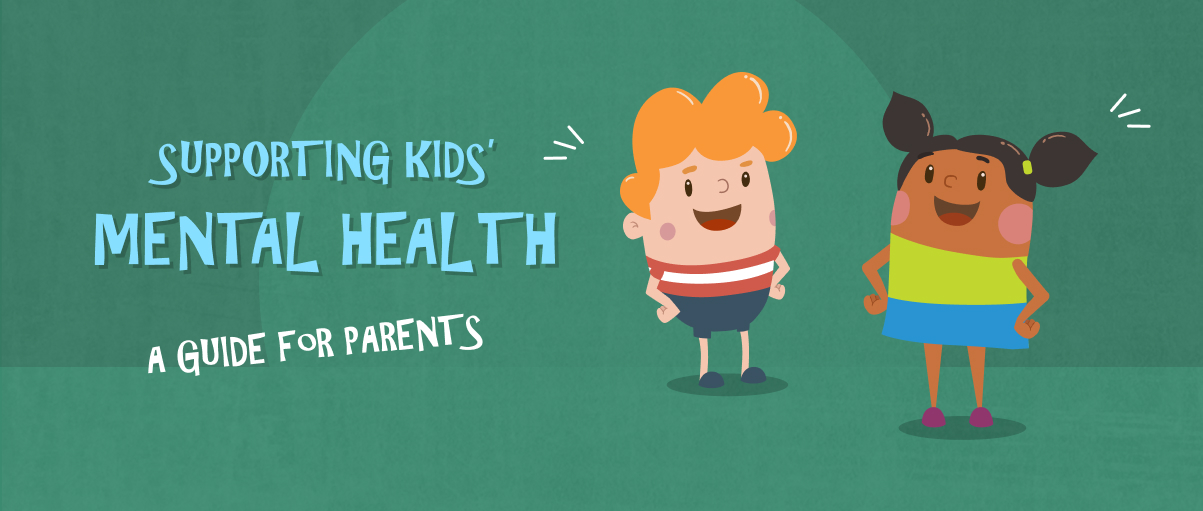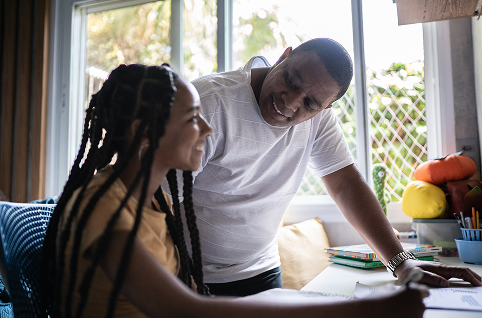


Empowering kids with tools to manage their mental health can start with conversations at home. By having these conversations about mental health with your kids, you are building trust and connections that make it easier for them to come to you with future concerns, issues, and questions.

As parents, it is important to encourage your kids to develop good practices for supporting their mental health. Whether it is checking in on how your kids are feeling, discussing appropriate coping strategies, or connecting your kids to a mental health professional, parents can do a lot to support their kids’ mental health during this important time in their lives.
Encourage your kids to identify and name their emotions
Kids can struggle to put their feelings into words. If they can name their emotions, it’s easier to have a conversation. A resource like a feelings wheel can be used to help kids explore their emotions and describe the impact their emotions are having on them. Start with a basic emotion and use follow-up questions to help them identify the specific emotion they’re experiencing and why they might feel that way. Helping kids identify different emotional experiences provides an opportunity to emphasize that no emotions are “bad” or “good.” It’s best to start practicing this when everyone is calm.
Treat mental health like physical health
In a child’s life, mental health is just as important as physical health, yet the stigma can cause misunderstanding and shame. Shame, hesitation, or uncertainty often prevents kids from speaking openly about mental health struggles and seeking help. By talking about mental health in the same way you would discuss physical health, you can normalize conversations about mental health and work to eliminate this stigma.
Be conscious of language you use
The language used when talking about mental health has a big impact on how your kid views mental health and their willingness to talk about it.
Regulate, relate, reason
Having a conversation with a highly upset kid can be counterproductive. Psychiatrist Dr. Bruce Perry recommends instead of engaging in a conversation right away, it’s better to help kids regulate, relate, and reason. Here are his steps for helping them be ready to learn, think, and reflect.
At this point, you can work to repair the situation and talk to them about expectations and consequences while reassuring them that you care about them. This helps model that once emotions are processed, we can all move forward in a positive manner.
Keep the conversations going
Conversations about mental health should not be one-time occurrences. By continuing to talk about mental health with your kids, you are building trust and connections that make it easier for them to come to you with future concerns, issues and questions.
For more strategies on talking to kids about mental health, view Responsibility.org’s On Responsibility videos:

While conversations about mental health are important, modeling how you manage your own mental health shows your kids stress is normal and helps them learn positive coping strategies.
Encourage your kids to identify and name their emotions
Model healthy coping strategies when you are feeling overwhelmed and talk to your kids about the ways that you cope.
THESE STRATEGIES MIGHT INCLUDE:

Mental health can be tricky when dealing with kids and teenagers. Even small changes in a child’s behavior or emotional state can be a sign they are struggling. Children have a much harder time communicating what they are feeling, so it’s important for parents and caregivers to recognize the signs of mental health issues. Here are some key warning signs from Dr. Katie Friedman, M.D.
Behavioral Signs
Behavior changes are normal as kids and teenagers develop during adolescence, but some changes might be signs or symptoms of mental health struggles.
Physical Signs
Parents don’t always make the connection between physical symptoms and mental health. However, the body and mind are deeply connected. Your child may show physical symptoms that could be linked to mental health issues. If you notice these changes, start a conversation to create a space for your child to process and explore why the changes are happening:
Emotional Signs
Adolescence often comes with typical changes when it comes to emotional and social well-being, but more severe changes might be a sign your child is struggling with their mental health.

Dr. Katie Friedman, M.D.
board-certified pediatrician, writer, spokesperson, and mother.

A mental health crisis can arise suddenly. Knowing what to do is imperative to keeping your child safe and ensuring they receive the help they need. Learn what actions you should take with this information from Dr. Katie Friedman, M.D.
The first step is to assess the immediate risk of the situation. If the child is having thoughts of harming themselves or others, it’s crucial to call 911 or take them to the nearest emergency room.
If there is no immediate threat, schedule an appointment with a healthcare provider, such as your pediatrician. Make sure your child knows that you are taking their concerns seriously and keep them updated as you work to schedule an appointment.
While waiting for your appointment, you can reach out to local services or a mental health crisis hotline, such as 988.
24-Hour Resources
988 Suicide and Crisis Lifeline: 24/7, judgment-free support for mental health, substance use and more. Text, call, or chat 988.
SAMHSA’s National Helpline (1-800-662-HELP / 4357): A free, confidential, 24/7, 365-day-a-year treatment referral and information service (in English and Spanish) for individuals and families facing mental health or substance use disorders.
Many times, when a child is experiencing a mental health crisis their emotions can feel overwhelming. Recognizing that they are reaching out for help is essential. Providing support, avoiding judgment and actively listening to their concerns is incredibly important.
While quick assessment and immediate care are crucial during a mental health crisis, it is equally important to establish a long-term plan and a strong support system for sustained well-being. Ensure your child receives ongoing care through therapy and support from specialists.
One of the most important things you can do is build a supportive network around a child struggling with their mental health. This can include family, school staff, community resources, fostering open communications and a safe environment.

Dr. Katie Friedman, M.D.
board-certified pediatrician, writer, spokesperson, and mother.